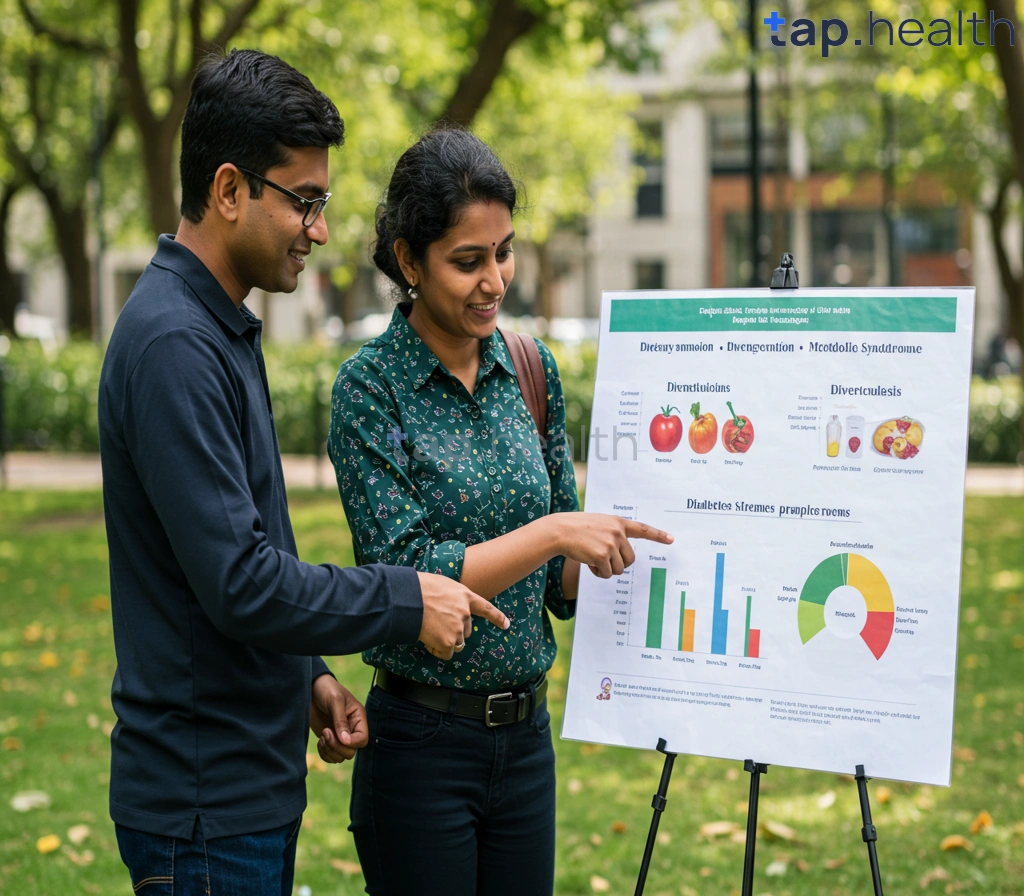Table of Contents
- Diabetes, Metabolic Syndrome & Diverticulosis: Dietary Links
- Understanding the Dietary Connections Between Diabetes and Metabolic Syndrome
- How Diet Impacts Diabetes, Metabolic Syndrome, and Diverticulosis
- Navigating Diet for Diabetes, Metabolic Syndrome, and Diverticulosis
- Prevent Diverticulitis: The Role of Diet in Managing Metabolic Issues
- Frequently Asked Questions
- References
Are you concerned about your risk for Diabetes, Metabolic Syndrome, or Diverticulosis? These three conditions, while seemingly distinct, often share surprising connections – and one of the most significant links is diet. This blog post will explore the intricate relationship between your food choices and your risk of developing these health issues. We’ll delve into the specific dietary factors that can either contribute to or help prevent these conditions, providing you with practical, actionable information to support your wellbeing. Understanding these connections is the first step towards making informed decisions for a healthier future.
Diabetes, Metabolic Syndrome & Diverticulosis: Dietary Links
Diabetes, metabolic syndrome, and diverticulosis share surprising dietary connections, particularly relevant in Indian and tropical countries where certain dietary habits are prevalent. Understanding these links is crucial for managing these conditions effectively. Managing carbohydrate intake is a cornerstone of diabetes management, and this directly impacts the other two conditions.
Carbohydrate Management and its Impact
For individuals with diabetes, maintaining a balanced carbohydrate intake is vital. Generally, a range of 45–60 grams of carbs per meal is suggested, though this varies depending on individual needs, activity levels, and medication. However, high-carbohydrate diets, particularly those rich in refined carbohydrates common in many Indian and tropical cuisines (like white rice and sugary sweets), can exacerbate insulin resistance, a key factor in both diabetes and metabolic syndrome. This insulin resistance can also contribute to the development of diverticulosis, as it affects gut motility and inflammation. Understanding the connection between diabetes and other metabolic issues is crucial, and you might find our article on The Link Between Diabetes and Fatty Liver insightful.
Dietary Recommendations for South Asian Diets
Focusing on complex carbohydrates like whole grains (brown rice, millets), legumes, and vegetables is key. These provide sustained energy release and are rich in fiber, which is crucial for both preventing diverticulitis (inflammation of diverticula) and regulating blood sugar levels. Limiting processed foods, sugary drinks, and refined grains is equally important. Incorporating traditional, fiber-rich Indian ingredients like dals (lentils), leafy greens, and a variety of spices can create delicious and healthy meals that support overall metabolic health. For a more detailed approach to dietary management, check out our Diet Chart for Diabetic Patients to Control Diabetes.
Taking Control
Consult a registered dietitian or healthcare professional for personalized dietary advice tailored to your specific needs and cultural preferences. They can help you create a meal plan that manages your carbohydrate intake effectively while incorporating the delicious and nutritious foods available in your region. Remember, small dietary changes can significantly impact your health.
Understanding the Dietary Connections Between Diabetes and Metabolic Syndrome
Diabetes and metabolic syndrome share a significant dietary connection, often intertwined and exacerbating each other. Metabolic syndrome, a cluster of conditions including high blood sugar, abdominal obesity, high blood pressure, and abnormal cholesterol levels, significantly increases the risk of developing type 2 diabetes. Poor dietary habits are a central factor in both. A diet high in refined carbohydrates, saturated fats, and processed foods contributes to insulin resistance, a hallmark of both conditions. This resistance hinders the body’s ability to effectively use insulin, leading to elevated blood sugar levels. In India and other tropical countries, where diets often feature refined carbohydrates like rice and sugary drinks, this poses a significant challenge.
Managing Blood Sugar and Reducing Risk
Actionable dietary changes are crucial for managing both conditions. Focusing on a diet rich in fruits, vegetables, whole grains, and lean proteins is vital. Limiting refined carbohydrates, sugary drinks, and unhealthy fats is equally important. Incorporating spices common in Indian cuisine, such as turmeric and cinnamon, which have potential anti-inflammatory and blood sugar-regulating properties, can be beneficial. Regular physical activity complements these dietary changes, enhancing insulin sensitivity and overall metabolic health. Nearly 30% of individuals with diabetes develop diabetic nephropathy (kidney disease), highlighting the crucial role of dietary management in preventing complications. Prioritizing kidney-friendly foods, such as low-sodium options and limiting protein intake, is particularly important for those with diabetes. Understanding the link between weight management and diabetes control is also crucial, so we recommend reading our article on Understanding the Link Between Diabetes and Obesity for more insights.
Prioritizing Health in Tropical Climates
Given the prevalence of diabetes and metabolic syndrome in India and other tropical countries, adopting these dietary changes is paramount. Seeking guidance from a registered dietitian or healthcare professional familiar with regional dietary practices is highly recommended to create a personalized plan that aligns with your cultural background and dietary preferences, effectively managing these conditions and minimizing associated risks. Remember, small changes in your diet can lead to significant improvements in your overall health and well-being. Choosing the right dietary approach can make a big difference, and to help you decide, you might find our comparison of different dietary approaches helpful: Low-Carb vs. Moderate-Carb Diets for Diabetes: What Works Best?
How Diet Impacts Diabetes, Metabolic Syndrome, and Diverticulosis
The Intertwined Role of Diet
The link between diet and chronic diseases like diabetes, metabolic syndrome, and diverticulosis is undeniable. Research shows a strong correlation; for instance, daily consumption of sugary beverages raises diabetes risk by 26%. This highlights the crucial role of dietary choices in managing or preventing these conditions, particularly relevant in Indian and tropical countries where dietary habits often include high levels of refined carbohydrates and sugars. Understanding how these conditions are linked through diet is crucial for effective prevention and management.
Dietary Factors and Disease Risk
High sugar intake, prevalent in many processed foods and sugary drinks common in Indian and tropical regions, significantly contributes to insulin resistance, a cornerstone of both diabetes and metabolic syndrome. This insulin resistance can lead to weight gain, high blood pressure, and abnormal cholesterol levels—all risk factors for heart disease, which is further exacerbated by diverticulosis, a condition involving pouches in the digestive tract. A diet rich in refined carbohydrates, common in many traditional Indian staples, can also contribute to these conditions.
Practical Dietary Strategies for Prevention and Management
Incorporating a diet rich in fiber, fruits, vegetables, and whole grains is crucial for managing all three conditions. Fiber promotes healthy digestion, alleviating symptoms of diverticulosis and helping regulate blood sugar levels, thereby mitigating diabetes and metabolic syndrome risks. Choosing lean protein sources and limiting processed foods, sugary drinks, and saturated fats are also essential steps. Prioritizing a balanced, plant-based diet adapted to regional preferences offers a powerful approach to reducing the risk of these interconnected health issues. For those looking to manage weight alongside diabetes, consider exploring How to Lose Weight with Diabetes Diet Plan for additional guidance.
Taking Action in Indian and Tropical Contexts
For individuals in Indian and tropical countries, focusing on incorporating locally sourced, fiber-rich fruits and vegetables, whole grains like brown rice and millets, and lean protein sources like lentils and fish, is crucial. This approach ensures a balanced diet rich in nutrients while aligning with cultural food preferences. Consult a healthcare professional or registered dietitian to tailor a personalized dietary plan that suits your individual needs and cultural context. It’s also important to consider the impact of different dietary approaches, such as the Carnivore Diet, and how they may affect diabetes management.
Navigating Diet for Diabetes, Metabolic Syndrome, and Diverticulosis
Managing diabetes, metabolic syndrome, and diverticulosis often requires a carefully planned dietary approach. These conditions, common in India and other tropical countries, share overlapping risk factors and can significantly impact quality of life. Understanding the dietary connections between these conditions is crucial for effective management. For example, the high prevalence of diabetes in many Indian populations is linked to a higher incidence of sleep apnea, a condition exacerbated by poor dietary choices. Studies show a 70% increased risk of sleep apnea and related sleep disorders in individuals with diabetes.
Dietary Strategies for Holistic Health
A diet rich in fiber is paramount for all three conditions. Fiber promotes healthy digestion, easing diverticulosis symptoms and helping regulate blood sugar levels, crucial for diabetes and metabolic syndrome management. Focus on incorporating whole grains, legumes, and a variety of fruits and vegetables common in Indian cuisine, such as rajma, moong dal, and methi. These are excellent sources of both soluble and insoluble fiber. Limiting refined carbohydrates, processed foods, and saturated fats is equally vital. These contribute to weight gain, insulin resistance, and inflammation – all significant factors in these conditions. For more specific strategies on managing blood sugar levels, you might find Enhance Gut Health and Manage Diabetes with Prebiotics and Probiotics helpful.
Region-Specific Considerations
In tropical climates, hydration is key. Staying well-hydrated supports kidney function, which is particularly important for those with diabetes. Incorporating spices like turmeric and ginger, commonly used in Indian cooking, can also offer anti-inflammatory benefits. However, it’s essential to consult a doctor or registered dietitian for personalized dietary advice tailored to your specific needs and regional dietary habits. They can help create a meal plan that balances your cultural preferences with your health goals. This personalized approach is crucial for long-term success in managing these interconnected health challenges. Planning festive meals can be tricky, but Creating Diabetes-Friendly Dishes for the Holidays offers some helpful tips and recipes.
Prevent Diverticulitis: The Role of Diet in Managing Metabolic Issues
Up to 80% of Type 2 diabetes cases can be delayed or prevented through lifestyle changes, highlighting the crucial role of diet in overall metabolic health. This is particularly relevant in managing conditions like diverticulosis, a common ailment in India and other tropical countries, often linked to poor dietary habits. A diet high in refined carbohydrates and low in fiber is a significant risk factor for both diabetes and diverticulosis. The lack of fiber leads to constipation, increasing pressure within the colon and promoting the formation of diverticula (small pouches in the colon wall). This, in turn, can lead to diverticulitis, a painful inflammation of these pouches.
Dietary Strategies for Prevention
Managing metabolic issues, such as those associated with diabetes and metabolic syndrome, is key to preventing diverticulitis. Focus on a diet rich in fiber, including whole grains like brown rice and whole wheat roti (common Indian staples), along with plenty of fruits and vegetables. These foods promote regular bowel movements, reducing pressure on the colon. Reducing refined carbohydrates, sugary drinks, and processed foods is also crucial. These contribute to weight gain, insulin resistance (a hallmark of diabetes), and inflammation, all increasing the risk of diverticulitis. Similar dietary principles are crucial for managing other conditions impacted by metabolic health, such as those discussed in The Role of Diet in Preventing and Managing Stroke.
Region-Specific Considerations
In Indian and tropical climates, incorporating readily available high-fiber foods like moong dal, rajma, and various leafy greens can be highly beneficial. Regular consumption of these foods supports healthy gut function and reduces the risk of both diverticulosis and its complications. Remember, a balanced diet, rich in fiber and low in processed foods, forms the cornerstone of preventing diverticulitis while simultaneously managing underlying metabolic conditions like diabetes and metabolic syndrome. Consult a healthcare professional or registered dietitian for personalized dietary advice tailored to your specific needs and health status. For more information on how diet impacts joint health, see our article on Managing Osteoarthritis with Diet.
Frequently Asked Questions on Diabetes, Metabolic Syndrome & Diverticulosis Diet
Q1. What are the main dietary links between diabetes, metabolic syndrome, and diverticulosis?
High refined carbohydrate intake, common in many regions, is a major factor. It worsens insulin resistance (key in diabetes and metabolic syndrome) and affects gut health, increasing diverticulosis risk.
Q2. What kind of diet is recommended to manage these conditions?
A balanced diet is crucial, focusing on 45-60 grams of carbohydrates per meal (adjust as needed). Prioritize complex carbohydrates like whole grains, legumes, and vegetables. Limit processed foods, sugary drinks, and refined grains. Fiber-rich foods are especially important.
Q3. How important is fiber in managing these health issues?
Fiber is critical. It helps prevent diverticulitis (inflammation of the diverticula) and regulates blood sugar levels, benefiting both diabetes and metabolic syndrome.
Q4. Should I try to manage these conditions through diet alone?
While dietary changes are essential, personalized advice from a registered dietitian or healthcare professional is crucial for effective management. They can consider individual needs and cultural preferences.
Q5. What are the potential risks if I don’t manage my diet properly?
Poor dietary choices can worsen insulin resistance, leading to complications from diabetes and metabolic syndrome. It can also increase the risk of diverticulitis and other digestive issues.
References
- A Practical Guide to Integrated Type 2 Diabetes Care: https://www.hse.ie/eng/services/list/2/primarycare/east-coast-diabetes-service/management-of-type-2-diabetes/diabetes-and-pregnancy/icgp-guide-to-integrated-type-2.pdf
- Diabetes Mellitus: Understanding the Disease, Its Diagnosis, and Management Strategies in Present Scenario: https://www.ajol.info/index.php/ajbr/article/view/283152/266731




